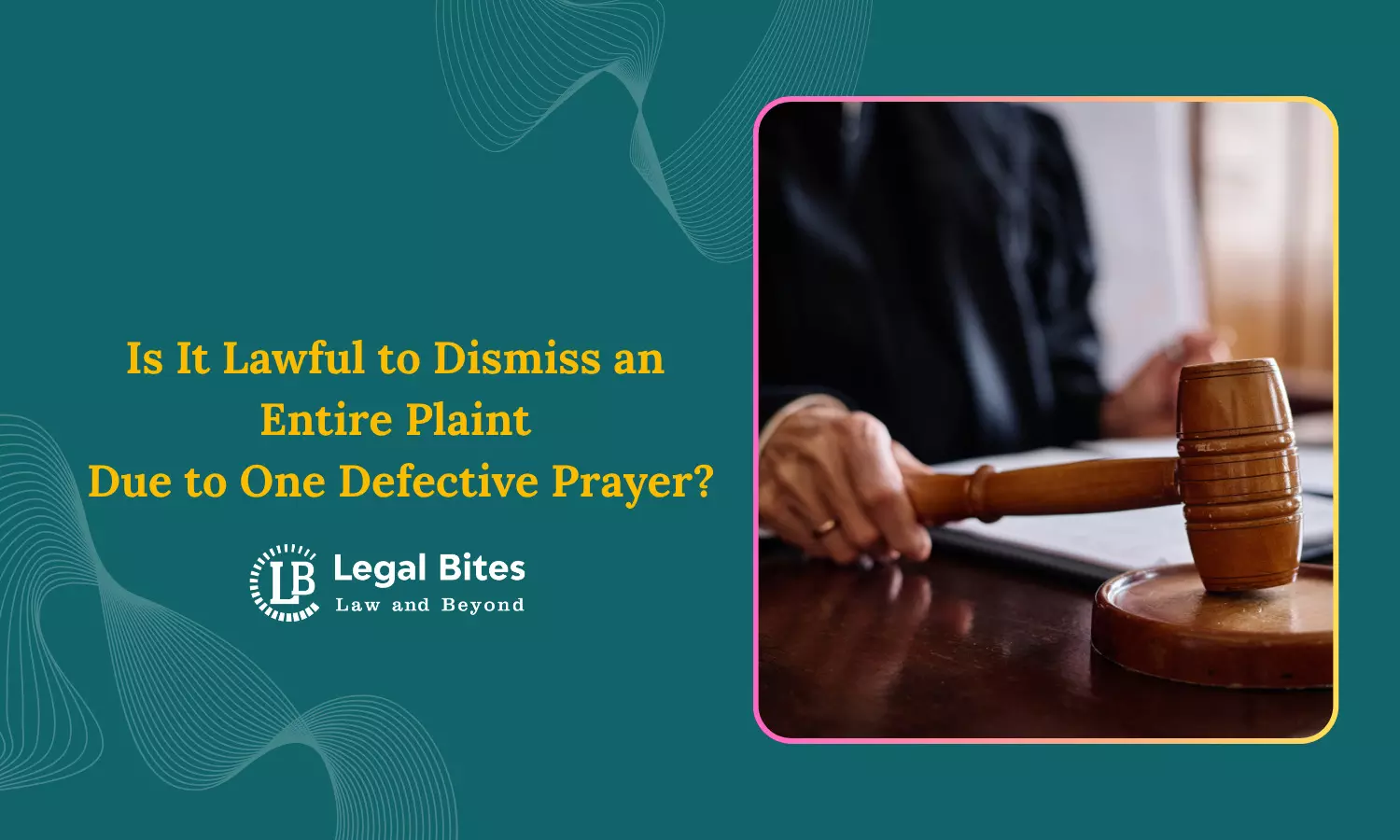Is It Lawful to Dismiss an Entire Plaint Due to One Defective Prayer?
As long as one valid cause of action exists, a civil suit must proceed to trial and parties must get the chance to prove their case in court.

In civil litigation, pleadings form the foundation of a party’s case. The plaint, filed by the plaintiff, must disclose a cause of action, be appropriately valued, pay requisite court fees, and seek specific reliefs. However, a recurring legal question arises: Can an entire plaint be rejected merely because one of the reliefs or prayers sought is legally untenable or procedurally flawed?
The Supreme Court of India, in Vinod Infra Developers Ltd. v. Mahaveer Lunia & Ors. (2025 INSC 772), has provided critical clarity on this issue, affirming the doctrine that the fate of an entire suit should not hinge on a single defective prayer.
Understanding Order VII Rule 11 CPC
Order VII Rule 11 of the Code of Civil Procedure, 1908 (CPC), provides for rejection of a plaint at the threshold stage if:
- It does not disclose a cause of action,
- The relief claimed is undervalued and the plaintiff, on being required, fails to correct the valuation.
- The suit is insufficiently stamped,
- The suit appears from the statement in the plaint to be barred by any law.
This provision is meant to prevent the court's time from being consumed by hopeless litigation. However, it does not allow the court to assess the correctness of the reliefs claimed or delve into disputed facts at the pre-trial stage.
Legal Fallacy of Rejection Based on One Defective Prayer
The key legal principle is that a plaint cannot be rejected in its entirety merely because one of the several prayers is defective, irrelevant, or barred by law, if the other prayers disclose valid causes of action.
The Supreme Court reiterated this principle in Central Bank of India v. Prabha Jain (2025 INSC 95), observing:
“Even if one relief survives, the plaint cannot be rejected under Order VII Rule 11 CPC. The doctrine of severance of causes of action must be approached with caution. The courts must refrain from dissecting the plaint for piecemeal rejection.”
This principle ensures procedural fairness and protects substantive rights by permitting a trial where genuine disputes arise.
Triable Issues Must Proceed to Trial
The essence of civil adjudication is the resolution of disputes based on evidence. When the facts are disputed—such as questions of title, authority, revocation, or fraud—they must be adjudicated upon after the parties have had a full opportunity to lead evidence.
In Vinod Infra Developers, the appellant pleaded two distinct causes of action:
- The 2014 agreement to sell, which was argued to be a disguised mortgage,
- The execution of sale deeds in July 2022, after the revocation of the power of attorney.
The High Court erroneously rejected the plaint entirely based on the first cause, disregarding the second, thus violating the principle that even one valid ground sustains the plaint.
The Supreme Court held that triable issues regarding the validity of the 2022 sale deeds necessitated adjudication by a civil court, not rejection at the threshold. This aligns with the core objective of Order VII Rule 11—to weed out frivolous suits, not to short-circuit legitimate claims.
Role of Unregistered Documents and Jurisdictional Cautions
A significant argument by the respondents was the reliance on an unregistered power of attorney and agreement to sell. The Court, invoking settled jurisprudence, clarified:
- Unregistered documents required by law to be registered cannot confer title (Sections 17 & 49, Registration Act, 1908).
- An agreement to sell does not create any interest in property under Section 54, Transfer of Property Act, 1882.
- No title can be transferred through GPA/SA (General Power of Attorney/Sale Agreement) transactions (Suraj Lamp & Industries case).
However, the existence of unregistered documents, though not enforceable to confer ownership, can give rise to collateral claims or equitable remedies, which in themselves are triable. Dismissing such suits outright on procedural technicalities ignores substantive justice.
Improper Court Fee or Jurisdiction Should Not Dismiss Entire Suit
A common mistake in pleadings is inadequate valuation or insufficient court fees. Yet, as held in Tajender Singh Ghambhir v. Gurpreet Singh (2014) 10 SCC 702, this is not a ground to reject the plaint summarily:
“It is the court’s duty to allow an opportunity to cure the defect. Rejection without such an opportunity offends principles of natural justice.”
Similarly, if part of the relief lies within the jurisdiction of a revenue court (e.g., khatedari rights), and other parts within civil jurisdiction (e.g., title declaration), the court must sever the claims rather than rejecting the plaint entirely.
Severability Doctrine: A Shield Against Overreach
The doctrine of severability allows the court to maintain those parts of the plaint that are valid and reject or strike down only the defective portions. This balances two essential needs:
- The judiciary needs to avoid frivolous litigation,
- The litigant’s right to adjudication of genuine disputes.
In Vinod Infra Developers, the Supreme Court emphasised this doctrine, holding that:
“Where there are multiple and distinct causes of action pleaded, the court must evaluate each individually. The rejection of the entire plaint on the ground of one defective prayer results in injustice.”
The Court criticised the High Court for treating the second cause of action as "academic" and reiterated that overlapping prayers do not invalidate the whole plaint when there is an independent factual foundation.
Procedural Safeguards and Judicial Discipline
The judgment further reflects upon judicial discipline in dealing with Order VII Rule 11 applications:
- Factual disputes (e.g., fraudulent execution, validity of revocation, possession claims) cannot be decided at the threshold stage.
- The court must refrain from engaging in mini-trials or evaluating the merits at the rejection stage.
- No adverse observations should be made about maintainability unless the entire plaint is ex facie barred.
These safeguards protect the procedural integrity of the trial process and preserve the plaintiff’s right to a fair hearing.
Implications for Litigants and Drafting of Pleadings
This ruling carries important implications:
- Litigants should draft pleadings to clearly separate distinct causes of action and ensure reliefs flow logically from the facts.
- Trial courts must be cautious not to be swayed by partial invalidity or procedural gaps that are curable.
- Defendants seeking rejection of plaints must show that the entire plaint is barred under the specific grounds in Order VII Rule 11, not merely that a few claims are unsustainable.
Appellate courts must be wary of interfering with discretionary orders of the trial court unless clear jurisdictional error is shown.
Conclusion
The Supreme Court’s ruling in Vinod Infra Developers Ltd. v. Mahaveer Lunia & Ors. serves as a caution against judicial overreach in rejecting suits at the threshold. It reaffirms that procedural technicalities cannot override substantive justice. As long as one valid cause of action exists, a suit must proceed to trial, and litigants must be allowed to prove their case.
Dismissal of an entire plaint due to one defective prayer not only offends legal principles under Order VII Rule 11 CPC but also risks denying justice. Courts must adopt a nuanced approach, safeguarding both procedural propriety and litigant rights. After all, the judiciary exists not to avoid trials, but to deliver judgments based on a full and fair hearing.
Important Link
Law Library: Notes and Study Material for LLB, LLM, Judiciary, and Entrance Exams

